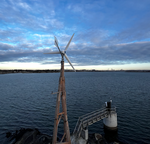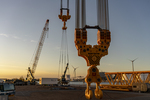News Release from American Clean Power Association (ACP)
Wind Industry Profile of
10/03/2011
AWEA Blog: Vermont’s wind energy: Responding to a New York Times op-ed
Opinions on the merits of various generation sources are the sign of our struggle to change. A recent New York Times opinion article by Stephen Wright is exactly that: the words of an individual spurred on by a small and vocal group in the small state of Vermont. This description of “disaster” is a means for that group to attract attention after not getting its way during a long, detailed and very public process of determining the Public Good of this generation project under our permitting law, Section 248 (a Certificate of Public Good is required for an electric project).
The findings of this regulatory process, garnered from the diverse parties that participated, the multiple public hearings conducted, the regular dose of media discussion and letters are what represent our state, our people and clearly our goals as described in the recently released (September) draft state Comprehensive Energy Plan. That plan calls for significant additions to renewable electric generation, a shift in our heating and transport energy methods, furthering our intense smart grid integration and major investment in efficiency in all sectors.
The 63-MW Kingdom Community Wind project in Lowell, Vt., is a part of this effort, which includes an effort to save our green mountains from ongoing acid rain from Midwest coal generation (which has killed pine trees and impacted vegetation on the very ridges Mr. Wright highlights).
Vermont is not under attack. Vermont has one of the strictest permitting climates, strong land use regulations, and multiple active groups ensuring that forests remain connected, streams are not clouded with runoff, and wildlife habitat is preserved. Wind farm permits have been denied in our state, and significant changes and mitigation have occurred during the process to obtain an approval, with the Department of Natural Resources imposing conditions on projects as well as enforcement and fines for failure to comply. The wind farm roads are required to be reduced in size once the project is constructed. Mr. Wright’s own town in Craftsbury, which is nearby, has no official position on the project, although he refers to the town as having one.
We have the lowest electric demand of New England and one of the smallest carbon footprints due to our significant portions of hydro and nuclear electricity as well as a leading energy efficiency program and efficiency expertise born here. Vermont is furthering this, and doing it where we can. We have an entrepreneurial spirit for creating and doing the right thing as well as forward thinking companies and, most especially, progressive electric utilities who are making investments in our energy future. Green Mountain Power, Washington Electric Coop, Burlington Electric Department, and even the publically traded Central Vermont Public Service Co. have all made investments in, purchased long-term power from, and in the case of Green Mountain Power, have developed and are building another wind project: the Kingdom Community Wind project, They are doing this to diversify their portfolios, prepare for the 2012 shutdown of our single 39-year-old nuclear plant, and most importantly offer what their customers are asking for; local, renewable energy in their back yard (two polls conducted over the past three years show over 80% and 90% approval and one of the polls explicitly asked if you want it in your back yard). (Conducted via Vermont Dept. Public Service; http://cdd.stanford.edu/polls/energy/2008/vermont-results.pdf)
Vermont has wind, solar and biomass resources and we are working to harness them all, large and small. We have progressive net metering legislation, as well as a focus on medium-scale generation via our Standard Offer program. For utility scale wind, we have hundreds of miles of north/south ridges that are exposed to the westerly prevailing winds. To date we have one 6-MW wind farm (Searsburg) operating, a 40-MW wind farm coming on line this fall (Sheffield) and a handful in development; therefore we are behind our nation and our goals to build more of this mature and cost-effective electric source. Even if we eventually build out enough wind for 25% of our electric needs, this would require roughly 4% of our ridgelines (and important to note: the use of 5% of ridgeline would additionally provide over 50% of an electric-powered transportation resource (see: http://www.vpirg.org/repowervt ), thereby addressing the issue Mr. Wright correctly raises on offsetting transport and heating emissions. None of the above wind farm areas would include sites our environmental and historic groups have noted to be preserved, and in several areas, the wind farms would help preserve habitat by placing large tracts in productive use. One can witness the bear fur on a Searsburg wind turbine tower door to see how the bears found a scratching post.
The northern forest is not being torn apart by these plans; in fact, even the most zealous wind person would say the state will likely only support about a dozen wind farms and most of these 75 MW or less in capacity—in parts of the state where wind resource and transmission exist. These farms offer the promise of supplying a significant portion of our small demand, as well as keeping energy dollars circulating in state. Neighboring states have, if anything, found tourism bolstered by wind farms, and a working landscape enhanced by local generation and local jobs.
I would counter Mr Wright’s perspective, and say the environmental groups have taken a stand and a clear one: A October 10, 2010 joint press release: “The Conservation Law Foundation (CLF), Vermont League of Conservation Voters Education Fund (VLCV- EF), Vermont Natural Resources Council (VNRC) and Vermont Public Interest Research Group (VPIRG) support the development of wind energy in Vermont. This collective statement of support for wind, and other renewable energy technologies, is based on our deep concern that society has not moved fast or aggressively enough to address the most urgent environmental crisis in human history: climate change.”
We all love our Green Mountains and are proud of our efforts in helping green the planet.
For more information on this article or if you would like to know more about what www.windfair.net can offer, please do not hesitate to contact Trevor Sievert at ts@windfair.net
www.windfair.net is the largest international B2B Internet platform – ultimately designed for connecting wind energy enthusiasts and companies across the globe!
The findings of this regulatory process, garnered from the diverse parties that participated, the multiple public hearings conducted, the regular dose of media discussion and letters are what represent our state, our people and clearly our goals as described in the recently released (September) draft state Comprehensive Energy Plan. That plan calls for significant additions to renewable electric generation, a shift in our heating and transport energy methods, furthering our intense smart grid integration and major investment in efficiency in all sectors.
The 63-MW Kingdom Community Wind project in Lowell, Vt., is a part of this effort, which includes an effort to save our green mountains from ongoing acid rain from Midwest coal generation (which has killed pine trees and impacted vegetation on the very ridges Mr. Wright highlights).
Vermont is not under attack. Vermont has one of the strictest permitting climates, strong land use regulations, and multiple active groups ensuring that forests remain connected, streams are not clouded with runoff, and wildlife habitat is preserved. Wind farm permits have been denied in our state, and significant changes and mitigation have occurred during the process to obtain an approval, with the Department of Natural Resources imposing conditions on projects as well as enforcement and fines for failure to comply. The wind farm roads are required to be reduced in size once the project is constructed. Mr. Wright’s own town in Craftsbury, which is nearby, has no official position on the project, although he refers to the town as having one.
We have the lowest electric demand of New England and one of the smallest carbon footprints due to our significant portions of hydro and nuclear electricity as well as a leading energy efficiency program and efficiency expertise born here. Vermont is furthering this, and doing it where we can. We have an entrepreneurial spirit for creating and doing the right thing as well as forward thinking companies and, most especially, progressive electric utilities who are making investments in our energy future. Green Mountain Power, Washington Electric Coop, Burlington Electric Department, and even the publically traded Central Vermont Public Service Co. have all made investments in, purchased long-term power from, and in the case of Green Mountain Power, have developed and are building another wind project: the Kingdom Community Wind project, They are doing this to diversify their portfolios, prepare for the 2012 shutdown of our single 39-year-old nuclear plant, and most importantly offer what their customers are asking for; local, renewable energy in their back yard (two polls conducted over the past three years show over 80% and 90% approval and one of the polls explicitly asked if you want it in your back yard). (Conducted via Vermont Dept. Public Service; http://cdd.stanford.edu/polls/energy/2008/vermont-results.pdf)
Vermont has wind, solar and biomass resources and we are working to harness them all, large and small. We have progressive net metering legislation, as well as a focus on medium-scale generation via our Standard Offer program. For utility scale wind, we have hundreds of miles of north/south ridges that are exposed to the westerly prevailing winds. To date we have one 6-MW wind farm (Searsburg) operating, a 40-MW wind farm coming on line this fall (Sheffield) and a handful in development; therefore we are behind our nation and our goals to build more of this mature and cost-effective electric source. Even if we eventually build out enough wind for 25% of our electric needs, this would require roughly 4% of our ridgelines (and important to note: the use of 5% of ridgeline would additionally provide over 50% of an electric-powered transportation resource (see: http://www.vpirg.org/repowervt ), thereby addressing the issue Mr. Wright correctly raises on offsetting transport and heating emissions. None of the above wind farm areas would include sites our environmental and historic groups have noted to be preserved, and in several areas, the wind farms would help preserve habitat by placing large tracts in productive use. One can witness the bear fur on a Searsburg wind turbine tower door to see how the bears found a scratching post.
The northern forest is not being torn apart by these plans; in fact, even the most zealous wind person would say the state will likely only support about a dozen wind farms and most of these 75 MW or less in capacity—in parts of the state where wind resource and transmission exist. These farms offer the promise of supplying a significant portion of our small demand, as well as keeping energy dollars circulating in state. Neighboring states have, if anything, found tourism bolstered by wind farms, and a working landscape enhanced by local generation and local jobs.
I would counter Mr Wright’s perspective, and say the environmental groups have taken a stand and a clear one: A October 10, 2010 joint press release: “The Conservation Law Foundation (CLF), Vermont League of Conservation Voters Education Fund (VLCV- EF), Vermont Natural Resources Council (VNRC) and Vermont Public Interest Research Group (VPIRG) support the development of wind energy in Vermont. This collective statement of support for wind, and other renewable energy technologies, is based on our deep concern that society has not moved fast or aggressively enough to address the most urgent environmental crisis in human history: climate change.”
We all love our Green Mountains and are proud of our efforts in helping green the planet.
For more information on this article or if you would like to know more about what www.windfair.net can offer, please do not hesitate to contact Trevor Sievert at ts@windfair.net
www.windfair.net is the largest international B2B Internet platform – ultimately designed for connecting wind energy enthusiasts and companies across the globe!
- Source:
- American Wind Energy Association
- Author:
- Posted by Trevor Sievert, Online Editorial Journalist / By Lawrence H. Mott
- Email:
- windmail@awea.org
- Link:
- www.awea.org/...
- Keywords:
- awea, wind, wind energy, wind turbine, rotorblade, awea, ewea, wind power, suppliers, manufacturers, renewable energy, trevor sievert










